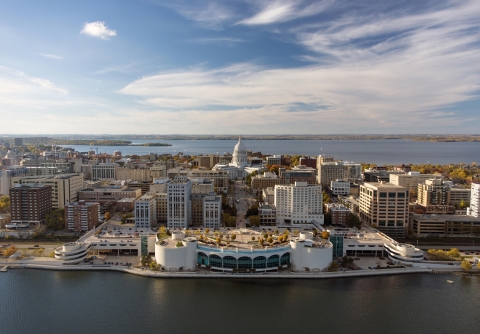How Madison, Wisconsin is Differentiating with Its One City, One Contract Program

The city of Madison, Wisconsin, while less than half the size of Milwaukee, has a lot of things going for it. For one, it has one of the best farmer’s markets in the United States (visit in July and you’ll see what we mean). It also sits right on Lake Mendota, making it a prime spot for water recreation; ranks among the top five healthiest cities in the country; and has a creative, energetic vibe thanks to University of Wisconsin-Madison.
It makes sense that many trade show organizers and meeting planners want to capitalize on all of those amenities by hosting events in Madison (among the largest event venues: Monona Terrace convention center and Alliant Energy Center). This spring, Destination Madison, the city’s CVB, is making the city even more attractive to potential meeting and trade show professionals with the launch of an innovative new program called “One City. One Contract.”
Through this program, planners sign one master contract for hotels in the city across multiple brands, which outlines terms such as force majeure, indemnification and how cut-off dates are administered. Then, hotels issue a simple addendum to this master contract that secures negotiated rates and concessions.
So far, it’s the only program of its kind in the U.S. We sat down with John Leinen, Destination Madison’s vice president of sales, to learn more about “One City. One Contract.” and how it’s coming along so far.

How did you come up with the idea for the program?
We saw this as an opportunity to differentiate ourselves in the meetings industry. One of the prevailing reasons I felt this way was how [the CVB and our hotel partners] work really well together, as we all have a sense of collaboration, community pride and friendliness. The industry is getting to be tougher as hotels are consolidating. Big brands own more market share, so they have the ability to control what contracts look like and seem to be less flexible. We thought this would be an area where we could really step up.
When did the wheels get set in motion?
Once we had a meeting and got everyone’s blessing, it went relatively quickly. We spent a few hours hashing out general practices, but getting into the nitty-gritty and contractual language and details was another six-month process. That wasn’t because of any major disagreements; it was about timing and getting everybody to be at the same place with legal teams, and so forth.
How did you convince Madison hotels to collaborate on this?
The tradeoff is the simplicity and the ease of which we’re providing our customers. Hotels will be able to get business done quicker, faster, better—no cost involved, no pay to play and no standardization of concessions. The best part is it works across brands.
And what about the terms—why makes them attractive to meeting planners?
The terms are derived from some of our big customers who negotiate contracts all over the U.S. We adopted a customer-centric approach, rather than haggling over [things like] attrition as lost profit over lost revenue, or cancellation policies on lost profit not lost revenue. A lot of major customers ask for that and often get it. We’re saying [with this one contract], ‘This is the right way to do business.’
Why do you think it took so long for a city to implement something like this?
I don't know that we’ve taken the time to ask what’s in the best interest of the customer. Why does that branded [hotel] contract really mean anything? Also perhaps somewhere there is an element of competitiveness. Certain cities [are] still are competing a lot to get that business, whereas here, we need to get them to Madison first, and the customer will figure out hotel selection process. We’re leaving it to the customer to decide what hotels to use, but saying let’s get them to choose Madison first.
How will you measure ROI?
The ROI will prove itself by customers telling us how much they value the process. My initial take will be once we get our first contract signed and how our customer related that experience to that. After chatting on the front end with 60 customers, a high percentage of them said, ‘Wow, that’s amazing somebody could do that.’ Some customers say, ‘That sounds great, but I have my own contract so that really doesn’t pertain to me.’ But we share with them that it’s not so much about what’s in the terms; it’s in the attitude. We’ve got a hotel world here that wants to center around making your job easier, helping you execute great conferences and allowing you to focus on other things rather than dealing with the contract.


Add new comment